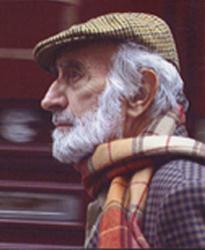2. Anglès
So many questions that are in me, standing up,
and I don't know who to put them to, and I pretend
that I respond to theirs.
Are my questions as childish
to another ear, as theirs appear to me?
Why, if my questions are heard,
does nobody answer?
They calm down, at times, with my responses …
But why is there never a voice
that comes to me, to console me?
Why do I alone, to myself alone, give the answers?
Are my questions too pretentious?
Is my ear not well enough tuned to hear the voice
of the answers?
Why is it that before our questions have
a response,
our children come to bother us with their own?
Are they, perhaps the answer we crave?
Is the question the only answer to the question?
Is the lively question of the child
the answer to the questions of the grown man?
Or could they be ours, the questions that are dead?
"Why don't grown-ups play?"
Is it our way of playing that explains theirs
or their play that explains us to ourselves?
Who is, here, the explanation of whom?
Am I not a living question in all my being?
Will death then be the dead response?
Why does life make us die in questions
And why does death live in the answers?
In me the two sexes are joined,
clarity of the enigma.
Good and evil in me are fused
in mutual need.
Hate and love are those who breed
because they love and detest one other.
And life and death are appearances.
Love more, if you can.
Hate more, if you want.
Do evil, do good;
one will do for the other.
Do more evil, do more good,
do what you want but more.
Excess is what counts.
Everything goes against itself
before it goes against something else.
Everything is born when it dies and dies when it is born
in this show.
The sexes do not penetrate,
or separate either,
but are joined at the root
in some place or another.
What is masculine? What is feminine?
All is the same and all is different.
If you divine it all in me
we shall make a pact.
Look how tender I am and refined
in this sense
and how fierce and hard-edged
in another.
Who is pushing war between us both?
What joins us and what drives us apart.
I love myself because I'm me;
the other, too, I love the same.
Joy and pain are sham.
Sense and madness are getting married tomorrow.
You will slay your parents, devour your children:
they rob you of strength and are your secret.
You will be child of your children and give birth to your parents.
Then you will be born, if you wish, of yourself.
In me the two sexes are joined,
clarity of the enigma.
Good and evil in me are fused
in mutual need.
Hate and love are those who breed
because they love and detest one other.
And life and death are appearances.
(Fragments from La Caverna (The Cave), Paris, Spring 1952, Grifeu, Spring 1969. Also collected in the book Les veus del ventríloc (The Ventriloquist's Voices))
* * *
TRIUMPH OF LOFTY MADNESS
For Joan Perucho
I climb on top of myself
and look:
and see myself as more transparent.
I didn't know, I didn't, that the wind went
with my head of hair
and that it could be so content.
Now all the time I grouch and glare
and out of me I fly
to abysses, endless routes and sky.
I don't have time to love: my arm isn't long enough
– Clara, Barbara, my friends –
to go around you,
to arrive at life.
And, you might as well know, I am learning to write in prose
the rose.
15 January 1943
(Poemes de l'Alquimista (The Alchemist's Poems): "L'Alienat: Imitació de Rosselló-Pòrcel: Arbre de Flames" (The Lunatic: Imitation of Rosselló-Pòrcel: Tree of Flames), 1945)
Translated from the Catalan by Julie Wark ©


